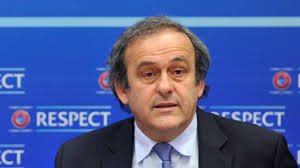By Andrew Warshaw
October 1 – Michel Platini may have his mind very much on the FIFA presidential election and whether he will actually still eligible as a result of the already notorious and still not fully explained SFr2 million payment he received whilst working for Sepp Blatter several years ago.
But he has now become embroiled in an unconnected but equally untimely episode that threatens to further undermine his credibility.
As well as being UEFA president, Platini is also head of the 2018 World Cup organising committee and has mandated Palestine to switch their forthcoming qualifier against Saudi Arabia from home soil to neutral ground, a ruling exposed by this website earlier this week and which has caused outrage in the region.
Palestine’s football association has protested both to Blatter and to Asian Football Association chief Sheikh Salman bin Ebrahim Al Khalifa who was one of the three powerbrokers, along with Platini and Kuwait’s Sheikh Ahmad Al-Fahad Al-Sabah, who made the decision in favour of the Saudis.
The ruling is not only highly controversial in itself but threatens to significantly weaken efforts to bring about footballing stability in the region. For all the criticism about the way he has run FIFA, Blatter has made it a priority to try and build lasting trust between Palestinian and Israeli officials.
A Palestine proposal to throw Israel out of FIFA for obstructing the free movement of players and equipment was dropped at the FIFA Congress in May in return for the establishment of a monitoring group led by South African human rights icon Tokyo Sexwale.
The current issue may not involve Israel per se but any sign of perceived prejudice against Palestine could undermine a highly sensitive set of negotiations. Quite why Platini’s three-man panel upheld the Saudis argument of force majeure is not explained in correspondence seen by Insideworldfootball though the likelihood of having to go through Israeli border controls could be behind the request. Plus, of course, Israel is a member of UEFA and Platini therefore has a delicate balancing act to negotiate.
Those on the sidelines of the FIFA election process make the point too that both Sheikh Salman and Sheikh Ahmad are strong supporters of Platini’s bid for the FIFA presidency. It is common knowledge that Asia has stated its preference for the Frenchman to replace Blatter.
Once again, it seems, politics, rather than football, is at the heart of the decision. Given how much Palestine values sport as a symbol of its international status, Platini’s endorsement of the Saudi position could be construed (and may well be by Blatter) as flying in the face of diplomatic attempts to make progress.
To what extent this is translated into votes next February – provided Platini is still in the race – remains to be seen but it has certainly not done him much good image-wise at a time when he is fighting for his very future as a leading administrator of the game.
Contact the writer of this story at moc.l1744426649labto1744426649ofdlr1744426649owedi1744426649sni@w1744426649ahsra1744426649w.wer1744426649dna1744426649

